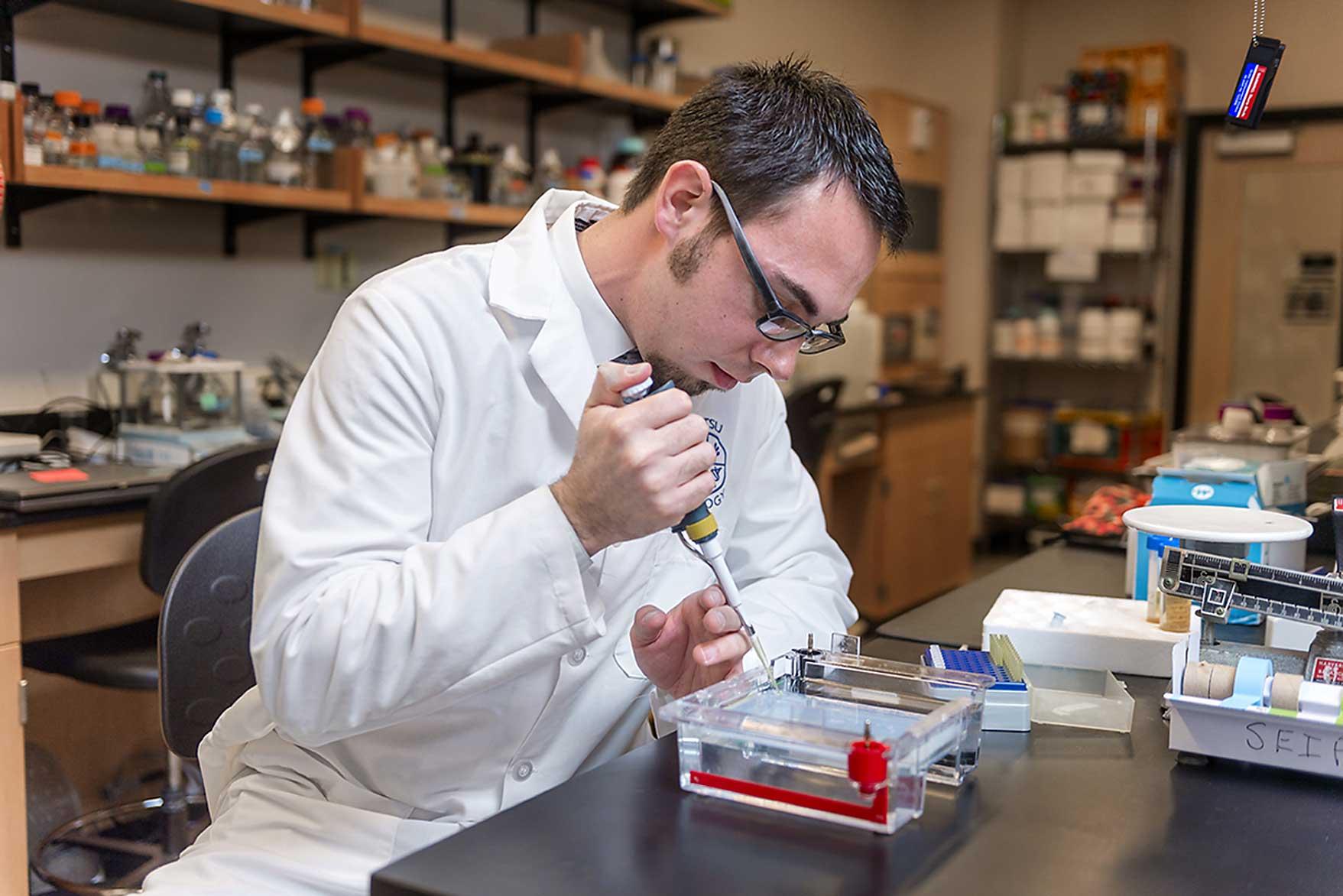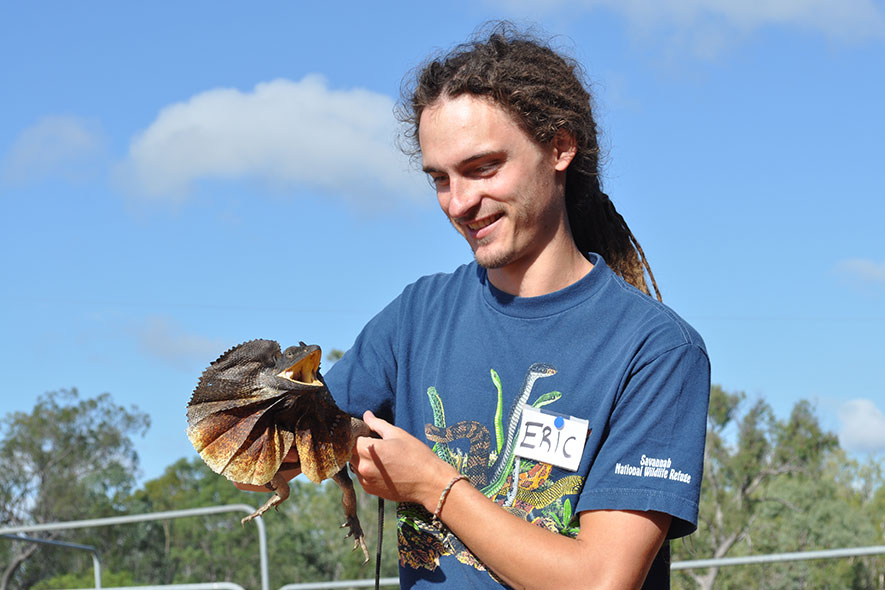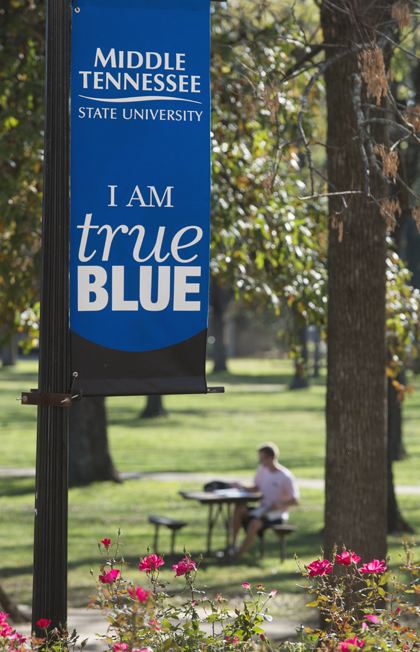
Biology
An advanced biology education with a tailored curriculum and research specializations across the biological sciences.
Biology, M.S.
MTSU's Master of Science program in Biology emphasizes research and preparation for further graduate study as well as employment with public agencies and private businesses.
The program can be custom-tailored to meet the needs and objectives of students. Students may pursue a general biology curriculum or may choose to focus their studies in one or more of the following specialization areas: botany, cell and molecular biology, ecology, genetics, microbiology, physiology, or zoology. Students learn in a state-of-the-art facility that includes more than 250,000 square feet for teaching, research, and collaborative learning. The Biology master's requires a minimum of 30 semester hours of graduate credit. The degree also includes written and oral comprehensive exams and a research thesis. Program completion typically requires two years.
News Briefs

Scholarship funds grad's Ph.D. research in Australia
Eric Nordberg landed one of two International Postgraduate Research Scholarships at Australia's James Cook University (JCU) after earning his M.S. in Biology at MTSU in December 2013. Nordberg moved to Townsville, Queensland, to start his doctoral research investigating the effects of cattle grazing on arboreal lizards. Most of his work involves describing the ecology and behavior of a common yet understudied arboreal gecko, the Dubious Dtella (Gehyra dubia). Nordberg lives near the Great Barrier Reef, with the rainforest an hour north and the dry tropical savanna an hour west. "JCU is a well-respected and highly ranked (top 4%) in global universities for studies in tropical biology and marine sciences," Nordberg says. "Australia also has a tremendous diversity of reptiles and other wildlife found nowhere else in the world. My master's thesis project at MTSU with Dr. Vince Cobb on the hibernation ecology of timber rattlesnakes prepared me well for entering into the research intensive program here at JCU."

M.S. alumnus supervises corporate labs in two states
Spring Nolin, a 2013 Biology M.S. graduate, was promoted in January 2014 to quality control supervisor at Vi-Jon, a manufacturer of health and beauty care products, in Smyrna, Tennessee. Nolin oversees four labs (raw materials, product release, stability, and methods development) in two states including in Missouri. While working on her master's, she had moved up to senior chemist at Vi-Jon. Nolin earned undergraduate degrees in Chemistry from MTSU (2006), where she played rugby, and in Biology from Martin Methodist College (2005), where she competed in soccer and softball. She was finishing her intermediate EMT license and contemplating medical school when she began working at Vi-Jon and decided to work on her master's. "Dr. Otter's work in environmental chemistry worked in closely with my instrumental and analytical work I was doing at Vi-Jon," Nolin said. Nolin works closely with the microbiology lab and the environmental safety department. Her thesis involved three different MTSU departments (Concrete Industry Management, Chemistry, and Biology). "I believe MTSU gave me the tools to reach for loftier goals," she said.
News Briefs
Scholarship funds grad's Ph.D. research in Australia

Eric Nordberg landed one of two International Postgraduate Research Scholarships at Australia's James Cook University (JCU) after earning his M.S. in Biology at MTSU in December 2013. Nordberg moved to Townsville, Queensland, to start his doctoral research investigating the effects of cattle grazing on arboreal lizards. Most of his work involves describing the ecology and behavior of a common yet understudied arboreal gecko, the Dubious Dtella (Gehyra dubia). Nordberg lives near the Great Barrier Reef, with the rainforest an hour north and the dry tropical savanna an hour west. "JCU is a well-respected and highly ranked (top 4%) in global universities for studies in tropical biology and marine sciences," Nordberg says. "Australia also has a tremendous diversity of reptiles and other wildlife found nowhere else in the world. My master's thesis project at MTSU with Dr. Vince Cobb on the hibernation ecology of timber rattlesnakes prepared me well for entering into the research intensive program here at JCU."
M.S. alumnus supervises corporate labs in two states

Spring Nolin, a 2013 Biology M.S. graduate, was promoted in January 2014 to quality control supervisor at Vi-Jon, a manufacturer of health and beauty care products, in Smyrna, Tennessee. Nolin oversees four labs (raw materials, product release, stability, and methods development) in two states including in Missouri. While working on her master's, she had moved up to senior chemist at Vi-Jon. Nolin earned undergraduate degrees in Chemistry from MTSU (2006), where she played rugby, and in Biology from Martin Methodist College (2005), where she competed in soccer and softball. She was finishing her intermediate EMT license and contemplating medical school when she began working at Vi-Jon and decided to work on her master's. "Dr. Otter's work in environmental chemistry worked in closely with my instrumental and analytical work I was doing at Vi-Jon," Nolin said. Nolin works closely with the microbiology lab and the environmental safety department. Her thesis involved three different MTSU departments (Concrete Industry Management, Chemistry, and Biology). "I believe MTSU gave me the tools to reach for loftier goals," she said.
Related Media

Recent M.S. graduates have followed a variety of career paths, including pursuit of advanced research degrees (Ph.D.) and professional degrees (M.D. for medicine, D.D.S.for dentistry, M.T. for medical technology); employment with a variety of private, university, state, or federal laboratories and agencies; and teaching in high schools and junior colleges. Possible professional positions with this degree:
- Bioinformatician
- Biologist
- Biology teacher
- Biotechnology operations manager
- College laboratory coordinator
- Community college faculty
- Commercial farm operations manager
- Ecologist
- Ecological/environmental consultant
- Environmental scientist
- Food technologist/safety specialist
- Information technologist
- Laboratory scientist
- Molecular biology analyst
- Museum curator
- Research assistant/associate
- Senior biochemist
- Senior chemist
- Surveyor
- Technician
- Water quality specialist
- Wildlife biologist
- Zoological park curator
Employers of MTSU alumni include
- Aegis Science Corp.
- Barrett Firearms Mfg.
- Boston Medical Center
- California University of Pennsylvania
- Central Medical Lab, Sulaimani, Iraq
- City of Franklin Water Resources Dept.
- Environmental Science Corp.
- Genetic Assays
- Grundy Greens Farm
- Harpeth High School
- ICON Clinical Research
- Illinois Natural History Survey
- Motlow State Community College
- Nashville State Community College
- Pope John Paul II High School
- Premiere Orthopedics
- Rockvale Middle School
- Siegel High School
- Site Engineering Consultants
- Stones River National Battlefield
- Tennessee Wildlife Resource Agency
- U.S. Air Force
- U.S. Geological Survey
- University of Connecticut Health Center
- Vanderbilt University
Doctoral/professional programs where graduates have been accepted include
- Arizona State University
- Indiana State University
- James Cook University, Australia
- Middle Tennessee State University
- Northern Illinois University
- Oklahoma State University
- Sao Paulo State University, Brazil
- University of Alabama-Birmingham
- University of Kentucky Medical School
- University of Louisville
- University of Memphis
- University of Mississippi
- University of Tennessee
- Uppsala University, Sweden
- Utah State University
- UT-Memphis Medical School
- Vanderbilt University
Click the Button Below to Apply
GRE scores are no longer required for applicants to the Biology MS program



- Biology graduate student handbook
- Biology seminars
- BioUpdate newsletters
- Faculty research
- Graduate assistantships
- Grants and scholarships
- Gulf Coast Research Laboratory
- MTSU Center for Cedar Glade Studies
- MTSU Center for Environmental Education
- Tennessee Center for Botanical Medicine Research
Click the Button Below to Apply
GRE scores are no longer required for applicants to the Biology MS program

CONTACT US

Please fill in the form below and we will contact you very soon











